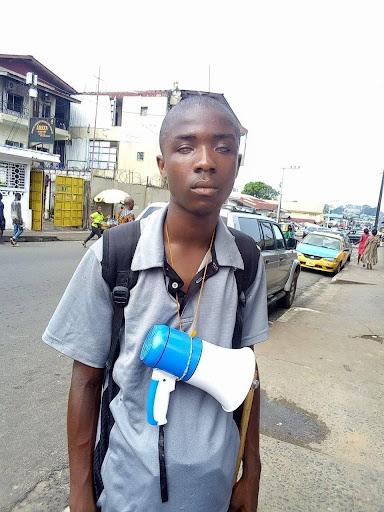From Blind Beggar to Street Entrepreneur

Visually impaired James Timothy on his regular business route, in Central Monrovia Thursday, November 4, 2021.
... How this visually impaired teen supports himself and his mother entrepreneurship and vocational knowledge
It is 10 a.m. in Central Monrovia and James Timothy, 14, has begun his normal trade -- selling airtime to make ends meet.
James, who is visually impaired, briskly skips over the keys of his phone in his left hand as he copies the customer’s phone number to send purchased mobile airtime or data for internet browsing.
“Your credit has been sent. Please check your phone,” he says to his young female customer while others stand by, watching him.
In response, the lady who had stopped James to buy the credit said, “You’re right, the fifty dollars (LRD) credit is in my phone.”
The successful transaction with the lady was all the confidence needed for two other persons to purchase L$20 to L$100 worth of airtime, respectively. With a megaphone dangling from his neck by a thin rope, James is able to call buyers’ attention to his business, while moving around Central Monrovia.
And as wonder and admiration appear on the faces of some of the people staring at his face or keenly monitoring the movement of his finger across the keypad of his service phone, James discloses that selling telecommunications credit is not all that he does. According to him, he also repairs bicycles and is handy in the trade of carpentry and masonry and moves in readiness to perform any at all times.
“I also have knowledge of carpentry, and I have knowledge of block-laying. I take my professional tools with me on my phone call credit/data business tour,” he added.
James lives in Topoe’s Village, a suburb of Bushrod Island on the fringes of Liberia’s capital, Monrovia, but commutes to the city center every day due to better profit margins he earns compared to selling in his community. James accrues a daily profit of between 25% and 50% from his airtime sales.
“I started this business last year, 2020, after seven years of begging on the street. In 2020, I said to myself, ‘never go on the street again to beg’,” he said. “Begging robs you of respect and that is why I decided to put an end to it. Business is better in Monrovia than where I live. I use the public transport bus each day to visit town for my business.”
Selling airtime is part of the business model used by Lonestar Cell MTN and Orange Liberia, the country’s two mobile telecommunication operators, to distribute airtime sales across the country, through independent salespersons like James. This model helps thousands of young people earn a living, and enables mobile subscribers to access airtime practically anywhere in the country.
This job-creation strategy, introduced by the foreign companies, is helping to slice Liberia’s multitude of jobless people—old and young. Some of those involved in the business are single mothers, as well as high school and college students — who depend on the income from their sales to tend to family upkeep, tuition and other needs.
James was not born with his visual impairment. It started when he was one year and six months old -- a situation that led to his father abandoning him. However, James’ mother never forsook him and remains his backbone.
“For now, she doesn’t have a regular job, so I share some of the profit of my business with her,” he said. When I was a kid, I was enrolled at the kindergarten section of three different schools for blind people—School of the Blind, Christian Association of the Blind, and UBA (United Blind Association). But I didn’t go beyond the Kindergarten level, due to financial barriers. The public is made to believe that each of these schools offers free education to blind people. But the people running them are commercial-oriented people,” he said.
The streets of Liberia’s capital city are swarmed with visually impaired people, most of whom are beggars, some as young as age five. For now, the Government of Liberia does not have a functioning welfare program for people with disabilities, even though the Government has a “welfare department” through the National Commission on Disabilities (NCD) and the Ministry of Gender, Children & Social Protection.
Clearly, James Timothy stands out among his visually impaired colleagues who otherwise opt for survival by begging. And at age 14, navigating the world of business and technology, determined to leave behind the life of begging, there is no telling what he can’t achieve.
Pop Quiz: Who else’s number is 14?
“I will be highly grateful if any financially privileged person, who has read your story about me, comes in to help me develop my business,” James said.
Samuel G. Dweh is a freelance journalist and president of the Liberia Association of Writers (LAW). He can be reached via phone on(+231) 886618906 / 776583266 or via email: samuelosophy@yahoo.com, samuelosophy1@gmail.com).
